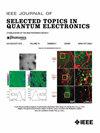基于自由运行宽域 VCSEL 阵列自恰动力学的并行片上物理随机数发生器
IF 4.3
2区 工程技术
Q1 ENGINEERING, ELECTRICAL & ELECTRONIC
IEEE Journal of Selected Topics in Quantum Electronics
Pub Date : 2024-09-16
DOI:10.1109/JSTQE.2024.3462489
引用次数: 0
摘要
随机数是互联数字世界的基石,被用于商业交易、计算和通信的安全加密协议中。与传统的确定性伪随机数相比,目前正在研究的物理随机数生成(RNG)方法是利用半导体激光器的混沌动力学来提高安全性、速度和紧凑性。然而,这些随机数生成方法存在离散和昂贵的组件,而且由于边缘发射配置造成的巨大占地面积,可扩展性有限,从而增加了成本,阻碍了集成设备的实际应用。在这里,我们首先利用自由运行的宽面积垂直腔表面发射激光器(BA-VCSEL)的自乱动力学,展示了并行芯片级 RNG。宽腔内激烈的模式相互作用为超快动力学提供了坚实的基础,从而实现了高安全性和高速 RNG。与小面积准单模 VCSEL(QSM-VCSEL)的对比分析证实,作为概念验证器件,单个 BA-VCSEL 通道可实现数百 Gb/s 的高速 RNG,四个通道可实现 2 Tb/s 的高速 RNG。鉴于 VCSEL 的易制造性和高可扩展性,这一发现为集成了光电探测器的低成本、大规模并行高速 RNG 芯片开辟了道路,为要求前所未有的 RNG 速率和高度网络安全的领域带来了机遇。本文章由计算机程序翻译,如有差异,请以英文原文为准。
Parallel On-Chip Physical Random Number Generator Based on Self-Chaotic Dynamics of Free-Running Broad-Area VCSEL Array
Random numbers, as a cornerstone in the interconnected digital world, are used in secure cryptographic protocols for commercial transactions, computing, and communications. Instead of the traditional deterministic pseudorandom numbers, physical random number generation (RNG) is currently being investigated by leveraging the chaotic dynamics of semiconductor lasers for improved security, speed, and compactness. However, those RNG approaches suffer from discrete and expensive components with limited scalability due to the enormous footprint imposed by the edge-emitting configuration, which increases the cost and impedes practical use in integrated devices. Herein, we demonstrated a parallel chip-scale RNG by first harnessing the self-chaotic dynamics of free-running broad-area vertical-cavity surface-emitting lasers (BA-VCSELs). The intense mode interaction within the broad-area cavity provides a robust foundation for ultrafast dynamics, allowing for high-security and high-speed RNG. Comparative analysis with a small-area quasi-single-mode VCSEL (QSM-VCSEL) confirms the efficacy of achieving high-speed RNG with hundreds of Gb/s from a single BA-VCSEL channel and 2 Tb/s from four channels as a proof-of-concept device. Given the easy fabrication and high scalability of VCSELs, this finding opens avenues for low-cost, massively parallel high-speed RNG chips with photodetector integration, unveiling opportunities for fields demanding unprecedented RNG rates and high levels of cybersecurity.
求助全文
通过发布文献求助,成功后即可免费获取论文全文。
去求助
来源期刊

IEEE Journal of Selected Topics in Quantum Electronics
工程技术-工程:电子与电气
CiteScore
10.60
自引率
2.00%
发文量
212
审稿时长
3 months
期刊介绍:
Papers published in the IEEE Journal of Selected Topics in Quantum Electronics fall within the broad field of science and technology of quantum electronics of a device, subsystem, or system-oriented nature. Each issue is devoted to a specific topic within this broad spectrum. Announcements of the topical areas planned for future issues, along with deadlines for receipt of manuscripts, are published in this Journal and in the IEEE Journal of Quantum Electronics. Generally, the scope of manuscripts appropriate to this Journal is the same as that for the IEEE Journal of Quantum Electronics. Manuscripts are published that report original theoretical and/or experimental research results that advance the scientific and technological base of quantum electronics devices, systems, or applications. The Journal is dedicated toward publishing research results that advance the state of the art or add to the understanding of the generation, amplification, modulation, detection, waveguiding, or propagation characteristics of coherent electromagnetic radiation having sub-millimeter and shorter wavelengths. In order to be suitable for publication in this Journal, the content of manuscripts concerned with subject-related research must have a potential impact on advancing the technological base of quantum electronic devices, systems, and/or applications. Potential authors of subject-related research have the responsibility of pointing out this potential impact. System-oriented manuscripts must be concerned with systems that perform a function previously unavailable or that outperform previously established systems that did not use quantum electronic components or concepts. Tutorial and review papers are by invitation only.
 求助内容:
求助内容: 应助结果提醒方式:
应助结果提醒方式:


